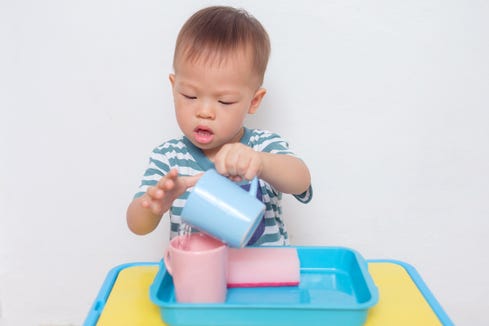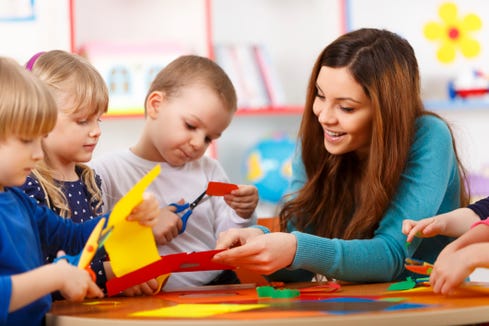Parents do a disservice to their kids when they assume that because they’re little, they can’t do many things. (Photo: FatCamera, Getty Images)
When children believe they’re capable, they’re more willing to challenge themselves, to try something new, to even fail several times but persistently keep at a task until they get it right.
Parents (myself included) often assume that because they’re little, they can’t do many things. So, we wait until we think they’ll be able to get it right quickly before giving them opportunities to try. With very good intentions at heart, we rob them of early opportunities to grow the self-confidence that is so integral to their success in all stages of development.
Kids are capable of so much more than we assume
Recently, I observed 3- to 5-year-olds at a Montessori preschool as part of an early childhood certification I’m working toward. It was an absolute jaw-dropping experience as I found myself increasingly amazed by the things they were doing on their own.
They used ceramic pitchers and glass cups (no plastic here!). They ate off of ceramic plates at snack time, which they then washed in soapy water and placed in a drying tub nearby. They worked independently or in small groups of two or three with quiet voices and consideration for those around them. The teacher was part of the environment, not the center of it.
Kids at a Montessori preschool ate off of ceramic plates at snack time, which they then washed in soapy water and placed in a drying tub nearby. (Photo: yaoinlove, Getty Images/iStockphoto)
“Wow, if every parent could watch this classroom in action,” I thought. We would understand on a very deep level just how capable our children are. And if we really understood that, we would change our behaviors at home.
How can parents can raise capable kids?
That classroom ran like a well-oiled machine because the teacher took time for training. She started by demonstrating (“Watch me”), requesting that the child notice one thing she did (“See how I use both hands?”) and then she watched the child try, and noticed what they did right (“Good, you’re using both hands.”) And she gave them encouragement (“Keep practicing. You’ll keep getting better.”)
How can parents take time for training? Well, first of all, make time.
If you teach your 2-year-old to pull on a shirt and a pair of pants (and not worry whether they’re backward) that will be one less thing you have to do for them, forever after. Get your 3-year-old a stool and teach them to carefully put one dish at a time away when clearing the dishwasher. If something breaks, help them get the broom and teach them to clean it up. (Yes, you might want to invest in some cheap dishes!)
Focus on process, not result.
Teach your 2-year-old to fold a shirt in half one way, then the other way and put it in the drawer. No, all the corners won’t match. Yes, it’s likely to be wrinkled when they pull it out to wear. But they’ll have done it themselves and they’ll know they are capable. Accuracy can come later. Right now, the emphasis is on, “Look what you can do! Yay!”
Do it together.
Growing capability means also having realistic expectations for a child’s attention span and perspective. Working together builds camaraderie and a culture of teamwork in your family. If you’re heaving an exhausted sigh over the mess in your child’s room, imagine what all those toys strewn about look like from a 4-year-old’s perspective. Accomplishing the task together is a great opportunity to teach organizational and spatial concepts:
“I wonder if all 10 trucks will fit in this box. Let’s see!”
“How could we get this shirt to stay on the hanger? Let’s try it together.”
Kids who know they are capable will persist when a task is difficult. (Photo: damircudic, Getty Images)
Now, imagine those children in the Montessori classroom 10 years from now. They know how to do for themselves with little adult intervention. They can focus on a task from start to finish. They can work independently or respectfully in groups. They know they are capable, so they persist when a task is difficult.
If you would like your child to join the ranks of these children, start now, and take time for training.
By Eva Dwight, BA, MEd, ACC, CPDT
Like All the Moms?
Follow us on Facebook and Twitter.
Source: Read Full Article


